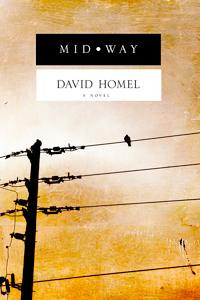The Mid-Life Crisis of Duddy Kravitz?
In 2001, while giving a talk on the art of film, Spike Lee described a very curious phenomenon of American cinema—the Magical Negro.
This character is a black man who comes out of nowhere to help the white protagonist recognize and overcome his flaws/weaknesses/obstacles, and is usually implied to have magical powers. He also has the power to appear only in movies that are craptacular (Cough, The Legend of Bagger Vance, cough, cough).
There’s a very similar, yet much more specific, character at work in David Homel’s novel, Midway—the Montreal Jew with a feeling of ennui. This character has popped up continually since the 1950s, due largely to legendary author Mordecai Richler. In many ways, these characters are all the bastard children that Duddy Kravitz never got to have. You can practically picture him avoiding them, at his office, making deals.
In the case of Midway, the mildly morose protagonist is Benjamin Allan, a doting son to his elderly, cantankerous, somewhat stereotypical father. He’s also the father of a TV-addicted son, and husband to a distant wife (although so little effort is put into fleshing her out that it’s hard to tell if she’s troubled or just a horrible person).
Benjamin has recently gained minor fame among his peers due to an academic paper/prose poem he wrote about an obscure mental disorder from the 19th century called dromomania, whose sufferers enter a fugue state and wander great distances. Simultaneously, he’s drawn to an employee at his school who also dabbles in creating hideous paintings, while also being drawn into the web of a nefarious psychiatrist who uses his patients to gather materials for the dolls he creates.
The book becomes somewhat confusing and melodramatic towards the middle, as Benjamin deals with his midlife crisis.
Except for Ben and his dad, most of the characters seem less like people than shadows or caricatures. The more I think about it, the more I think that this might have been intentional. What is a midlife crisis other than a period of raging narcissism, wherein everybody else is nothing but a supporting character in your personal self-realization movie? Still, it’s hard to get engaged in a novel where every personality remains the same, page after page, motivations unexplained, while the main character drones on and on about “what it all means.”
Midway is not a failure as a book. The relationship between Benjamin and his father offers a few genuine laughs as the alter kacker disregards all social norms and rambles at length about sex, religion and growing old. If you’ve met as many old Jewish men as I have, you will recognize this guy. If only all the other interactions had been this well-thought out, Midway would have been the first coming-of-age story for the postponed adulthood set.
As it is, it’s a fine, if occasionally irritating, story about being a secular Yid in the post-God world.
This article originally appeared in Volume 31, Issue 16, published November 30, 2010.




2_600_375_90_s_c1.jpg)

